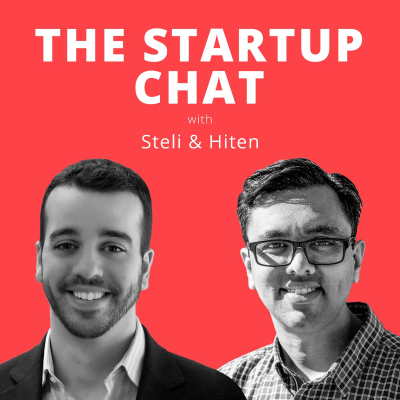
The Startup Chat with Steli and Hiten
inglés
Negocios
Disfruta 30 días gratis
4,99 € / mes después de la prueba.Cancela cuando quieras.
- 20 horas de audiolibros / mes
- Podcasts solo en Podimo
- Podcast gratuitos
Acerca de The Startup Chat with Steli and Hiten
Unfiltered insights and actionable advice straight from the trenches of startup and business life.
Todos los episodios
325 episodios530: Inbox Insanity? Archive All Your Emails Now!
In today’s episode of the startup chat, Steli and Hiten talk about why you should archive all your emails now. Email is one of the most common ways of communication in the startup world, and a lot of founders receive thousands of messages in their inbox. It goes without saying that managing your email is a crucial part of running a successful business and your life. In today’s episode, Steli and Hiten talk about why your inbox is not a prison, how responding to all emails can be counterproductive, Hiten’s relationship with email and much more. Time Stamped Show Notes: 00:00 About today’s topic. 00:37 Why this topic was chosen. 03:23 Why your inbox is not a prison. 04:48 Why you don’t have to respond to every email. 05:15 How responding to all emails can be counterproductive. 06:16 How there are better ways to manage your life than through email. 06:40 How email is still very commonly used. 07:12 Hiten’s relationship with email. 07:40 Tips to help you manage your email. 08:41 Why email shouldn’t stress you out. 3 Key Points: * Your inbox is not a prison. * This idea that you have to respond to every email is ridiculous. * There are better ways to manage your life than through email. Steli Efti: Hey everybody, this is Steli Efti. Hiten Shah: And this is Hiten Shah. Steli Efti: And today on the startup chat, we’re going to talk about a piece of advice that I gave to somebody recently, which is, archive all your emails right now, you don’t have to respond to a single one of them. So I want to frame this and share the story, and then I’m really curious, Hiten, what your response and comment is going to be on this. Here’s the deal, here’s the story. Recently, I was talking to somebody and he was super stressed out. He was telling me, “Listen Steli, I just took a vacation, just came back, my inbox is a mess, there’s all these emails in my inbox, I have the super important priorities that I need to tackle, and then there’s all these other projects, it’s just too much right now. I feel my anxiety is on 20 from a scale of 1 to 10. I’m trying to manage this, it’s been a week since I’ve been back and I’m struggling. What should I do?” And there’s a lot of nuance in this conversation, a lot of things that I’ll put to the side, but one of the pieces of advice that I gave him was, I talked to him a little bit about his inbox. And I asked him, “How many times do you check your inbox right now?” And he was like, “To be honest, every couple of minutes.” I’m like, “Do you always respond to an email when you check your inbox?” He was like, “No, right now it’s just so bad. I look at my inbox and I feel terrible and I leave again. But then I have to check it again to see if there’s something new in there or if I find the focus and the flow and the energy to start tackling some of them.” I was like, “All right. How many emails did you get your vacation?” He’s like, “You know, it’s not,” and that was the interesting part, “It’s not that many. Maybe I have 50 emails or so.” I’m like, “Okay, cool. How many emails in your inbox do you have that are older than a month?” And he was like, “I don’t know, a couple of hundred.” I’m like, “All right, try this. Just go to everything that’s older than two weeks ago and just archive all of it. Just archive it.” And he was like, “What if there’s something important in there?” And I told him, “If it’s that important, you should know about it and remember it, or it will pop up again because somebody is going to follow up or somebody is going to respond to some kind of a threat. More likely than not, especially with emails that are older than a month, if you have not responded in a month, you’re not going to respond in three months. I’m sure there’s emails in your inbox that are six months old. What are they doing there other than stressing you? You’re not going to respond and it doesn’t matter anymore. Just archive all of it. Don’t worry, the world will not end.” And I told him this story that, I had experienced this many years ago when I came back once from vacation. And I was talking to Anthony, my co-founder, and I had a similar situation where I was like, “Ah, I have so many emails, this, that and the other.” He was like, “Dude, your inbox is not a prison, these are all optional. You don’t have to respond to any of them.” I was like, “Yeah, but no, no, no, no, no.” He’s like, “You just archive everything. If it’s important, it’ll pop up again. Don’t worry about it. You’re overthinking this. Just archive it, and then you’ll feel good, and with that clean mindset, you can tackle the stuff that’s really important. And the emails that you’re really into, you know about. There’s a handful of things you need to, people you need to address, you won’t forget. So just do it.” I was like, “Ah…” And then he was like, “Hand me over your phone.” And I gave it to him because I trust him. And he was like, “Here, I’m going to do it for you. Just archive everything.” And at first I was like, “Oh my God, this is going to be my death, I’m going to fail, my company is going to fail, we’re going to be bankrupt, terrible things are going to happen.” And then nothing happened. I remembered a bunch of people and things that I knew I needed to send emails to, and I did, and a bunch of things that were more important or urgent that popped up in my inbox again, and I managed them then, and there was a shit ton of email that was probably nice to have, maybe something that could have been even good that I didn’t address, but it gave me the space to tackle some really important projects and make important decisions and move on in life. And I’m not saying that my general advice to everybody on earth is always just delete or archive all your emails and never respond to anything. But this idea that you have to respond to every single email, especially also you have to respond to emails even if they are months and months and months old is ridiculous and false. There’s no rule. You’re not going to go to jail. And I think we are overly stressed, and when we’re in this constant state, especially, people come back from vacation and now they would have had the peace of mind and clarity and calmness to make big decisions and to attack some really creative work, but they can’t because they’re getting bogged down on bullshit that doesn’t matter at the end of the day. So I’m dying to hear what you have to say about this piece of advice of, maybe you should just archive all of your emails, you don’t have to respond to them, especially coming from somebody like you who’s prolific in email and responds to everything as far as I know. What’s your response? What are you two immediate cents listening to this story? Hiten Shah: Well, first of all, I was expecting, not 200 emails, but a lot more. And so I’m like, “Oh, 200, that’s easy.” So that was the first reaction, because that’s not a lot of emails, and 50, that’s not a big deal, I can get through that pretty quickly. So first of all, that’s not a lot of email, in my opinion, after a vacation. I think the way I would put this, besides the things that you said is, the person must have been managing their life using email. And that’s not to say they were getting the wrong kind of emails or anything, it’s more to say that, if we get stressed out over how much email you have, you’re managing your life through email. There’s probably a better way to manage your life. And that means that you’re looking at that thing like it’s a task list, an inbox of shit you need to do that you don’t want to do. And so I think the higher level is, people probably have some work to do in general around their relationship with email. And the reason I say that is that’s how we communicate with the world today, and it’s probably the most ubiquitous, most common method people use to communicate today. And so I just look at that and I’m like, “Yeah, that’s a relationship problem with email. That’s not necessarily an inbox problem of too many emails.” I know a lot of people have that problem. Steli Efti: Let me ask you, how would you describe your relationship with email? Because you get a lot more emails than most people, and you respond to a lot more emails with a lot more thoughtful comments than most people. How do you think about your inbox? Hiten Shah: I don’t. I go to it when I want to go work on it, when I want to go through that list of tasks or whatever it is. And I get notifications rarely for it because I turn all those off. And so I go when I want to deal with it, and then I deal with it. And I try to answer things as quickly as I can and as best as I can and I move on with my life. So the way to not be in email is not be in email all the time. But that doesn’t mean you don’t answer your emails or you have to archive them all or anything like that. And I’m not saying you shouldn’t archive them, I’m good. I don’t know, for me, I don’t have any judgment over anybody on how they manage their time or how they manage their emails or whatever, because I think a lot of email is… When you learn how to deal with email, whatever your methodology is or your way of working is, you end up essentially realizing how to get control over parts of your life that you might’ve felt like you weren’t in control of. And so no judgment if you want to do and archive all, I think that’s great. If that makes you feel better after a vacation, that’s what you need to do, go for it. I think that there is an absolute truism around the idea that if you archive it all and something is important, you’re truly going to get bothered by it by somebody. And that’s acceptable. I think that’s okay, that’s something I believe in. But I don’t really archive my email very often. I’m also, I used to be way more into inbox zero, now I don’t care as much about having zero emails in my inbox because email just doesn’t stress me out. I think that’s the key. It’s your relationship with email, which is really about your relationship with how you do work. Steli Efti: Most people check their email as if it’s like- Hiten Shah: A chore? Steli Efti: A chore that you, at all times, need to know what the status of it is. It’s like, “I’m not going to respond to it right now, but I will check it because maybe there’s something urgent or important.” I don’t know, it’s like a habit people build where sometimes people will… If you observe people that look at their, observe them at their workspace, sometimes people will check their email every couple of minutes without ever responding to anything. They just keep checking. “Have I gotten a new email? Yes. Okay. Have I gotten a new email? Have I’ve gotten a new email. Have I gotten a new email?” And it’s like, you could just check once in that hour. Hiten Shah: Yep. Steli Efti: And this is not that uncommon. It’s also a thing of, maybe a boredom thing where, when I don’t know what to do, I just check email, I don’t know what to do. Just like people check their Twitter timeline or their Instagram or something, that’s like, don’t know what to do right now, or don’t want to do the thing I’m doing right now, distraction. And one piece of social media that’s in the constant distraction bucket, but also email, just my inbox. I’m just constantly checking it. And then it becomes a habit that controls you and runs you. You don’t run it anymore. You don’t decide when you want to look and what you want to do, you’re just becoming this slave that constantly checks it and feels, every time… The other crazy thing. Let’s say you have one email that you ought to respond to and you don’t feel like responding to today. Let’s say that that’s the case. Now, you could feel bad about that once today, you could be like, “I should really respond to this today, I’m not going to do it, huh, this feels bad. Hopefully, and probably tomorrow, I will.” But instead of doing that, people choose to feel bad 37 times that day about it. Hiten Shah: Yep. That’s totally true. Steli Efti: For no reason whatsoever, it doesn’t benefit it, it actually makes it less likely that you’re going to have a response to this email, because you’re making it bigger and bigger and bigger in your head and emotionally, and it doesn’t help the other person that you worry that much about it, they still haven’t gotten an email from you. So you could have just worried once versus 37 times over the entire day. Those are the things, I think the inbox, I can’t think of anything else, other than social media, where people have a similar relationship to where it becomes this thing that runs their life, this thing that becomes a to-do, this thing where they feel pressure. Every single email, they feel like they have to respond, and where they have these really bad habits where they check in way too often and just make it a source of constant anxiety and stress for no reason whatsoever. Hiten Shah: Yep. That’s what I see people do. That’s not necessary. Steli Efti: And the people that don’t do it, at the center of it all, is a decision that, I don’t have to live this way and I’m going to take ownership and this is the way I’m going to deal with it. Either you have a process, or like you, you’re like, “I don’t feel bothered by this. This is something, whenever I want, I can do it, I can do it one way or another, it doesn’t really fucking matter.” Hiten Shah: It’s like being bothered by all the spam messages you get. It’s the same. It’s like, dude, they’re just emails. What’s the big deal? You don’t really think of spam twice, so why think of your email box twice? Is anything that urgent? That’s the thing. I think email implies urgency to some extent, it’s just not that urgent. It shouldn’t matter, but we make it matter. Steli Efti: But it’s in our mind. This is not gravity, this is not some physical law. Hiten Shah: That’s right. Steli Efti: We all, because we’ll pretend it is that way, it feels that way, but it really isn’t. You can choose what you’re going to do, you could answer all emails just once a day, you could choose not to answer most emails and just respond to the things that you really feel important. You could choose to respond to every single email with really thoughtful… You can choose what you want, there’s no rules. And this is not some homework that the world is putting on your table and you are this powerless being that has to finish it no matter how dumb it is, or no matter how little you want it, or no matter how little value it provides you. You can choose, you can make that choice and you’re not going to get to jail, and the world is going to be fine. You can choose whatever you want, the world is going to be fine, I promise to you. All right. I think that’s it for this episode. I’m curious to see what people will say about it, what they’ll share with us on this, and until next time, we’ll hear very soon. Hiten Shah: See yah. The post 530: Inbox Insanity? Archive All Your Emails Now! [https://thestartupchat.com/ep530/] appeared first on The Startup Chat with Steli & Hiten [https://thestartupchat.com].
529: Self-Management Is the Best Management
Today on The Startup Chat, Steli and Hiten talk how self-management is the best management. Managing yourself is one of the most important skills a person can develop, especially if you want to be a successful leader and manage other people. In today’s episode of the show, Steli and Hiten what self-management means, the importance of self-management, some principles of good management and much more. Time Stamped Show Notes: 00:00 About today’s topic 00:39 Why this topic was chosen. 01:21 Why knowing what you control is super important. 02:25 Why self-managed people are some of the best people to work with. 02:39 What self-management means. 03:38 Why you should start with you. 04:27 Why you should live a truly good life in front of your children. 05:35 How it’s so much easier to tell people what to do. 08:40 The importance of self-management. 09:07 The principles of management. 3 Key Points: * A lot of it has to do with knowing what you control. * Self-managed people are some of the best people to work with. * Self-management is figuring out what to do and not ask other people what you should be doing. Steli Efti: Hey everybody, this is Steli Efti. Hiten Shah: And this is Hiten Shah. And today on The Startup Chat, we’re going to talk about how self-management is the best management, because I tweeted that and I think Steli liked it. Steli Efti: Yeah. Hiten Shah: And I tweeted it because it just came in my head. I had no rhyme or reason. Steli Efti: How the fuck do you do this? You’re just like, you’re just walking down the street and you see birds chirping, and you’re like, “Ah, wait a second, before I continue watching these birds. Self-management is the best management.” How did it just pop up in your head? Hiten Shah: I don’t know. I just thought about it. I don’t know. I just thought about it. I just thought about something and it just popped in my head, and I was like, “Oh, yeah, this is a good one. Let me go share this today.” I strongly believe that. And a lot of it has to do with knowing what you control. And you just control yourself and how you manage yourself. And I think that can extend to many different areas. We can talk about it in many different ways, but at the end of the day, I really truly believe self management is really the best management. And one thing, one way, if you are a manager of any kind that you can kind of resonate with this or maybe have some familiarity with the concept, is when you have somebody who you’re managing, you’re responsible for, and their ability to manage themselves is just incredible. So, the management you have to do is very light because they’re bringing what their needs to the table for you. They’re documenting things. They’re basically managing themselves, which makes it so that you don’t have to manage them. And I’m not saying that you shouldn’t manage them. I’m not saying that you shouldn’t be involved. This isn’t even a management style thing. This is literally, self-managed people are some of the best people to work with. Self-managed people are sort of some of the people that have the most … That appear to be more put together because they’re just managing themselves. Even if everything’s going to hell in a hand basket or whatever they call it, they’re still sitting there capable of basically figuring out what to do. So, a lot of self-management to me is more about figuring out what to do and not having to ask other people what you should be doing. And this applies to so many different scenarios. It’s kind of hilarious because it’s kind of like this thing where you’re taking control of what you can control, and you’re not worried about things that are outside of your control. If you think of self-management and think of it as self-management, you could put yourself in that mindset even if you don’t have a lot of experience with management or managing people and things, or feel like you’re not good at to-do lists, and stuff like that. It’s not about that. It’s about having the sort of awareness that if you manage yourself, you get to control your time. You don’t manage yourself, you don’t get to control your time. Someone else is controlling your time. Steli Efti: I love that. And this is one of these universal uncomfortable truths where if you want to start changing the world, clean your room, make your bed. Right? Hiten Shah: Yeah. Steli Efti: Get your affairs in order. Do your shit first. I remember. I used to say this to people jokingly. Before I had children, I always used to tell people, “I’m going to write a book about how to raise children before I’m becoming a dad.” I never did that obviously, but I was like, “I’m going to write a book.” [crosstalk] And that- Hiten Shah: You and the books. Yes. Steli Efti: And I’m like, “And that book is going to be two pages. And it’s just going to say, ‘Get your shit together. Just whatever you want your children’s life to look like, make sure you live it in front of them. You’ve got to tackle your fears. Be honest, grow, learn, be humble. Just live a truly good life in front of them and they’ll be fine. They’ll learn everything they need to learn by watching you. There’s nothing you need to pretend to do or say to them while privately your shit’s fucked up.'” Right? And think, “Well, I read these 20 books about perfect child education. And so, my children truly are going to benefit from this.” Maybe they will a little bit, but if you just don’t have your affairs in order, they’re not. They’re just going to copy your behavior. It’s the same thing … Back in the day when I was a kid … I don’t know I was for you, but all my uncles would smoke and all of them would forbid their children to smoke. And I always thought that’s kind of weird. I was like, “What logic is this? They’re sitting here in the living room smoking a cigarette.” But then once they saw that one of the kids, when they were 16 smoked in school or something, they had lost their shit, and they were screaming at them. And I’m like, “Motherfucker, you’re smoking as well? How you manage your child? What is this?” So, the same thing. But it’s so much easier. It’s for all of us. It’s so much easier for me to tell you what to do than to do it myself correctly. [crosstalk 00:05:24]. Hiten Shah: Always, yeah. Steli Efti: To live up to it. And- Hiten Shah: My dad actually told me, “Do what I say, not what I do.” Steli Efti: Do what I say, not what I do. Your dad is not the only one, right. How many people have done this? Hiten Shah: He just straight up told me that. I was like, “All right, dude. Cool. Great. Steli Efti: Yeah. How illogical is this? Don’t do what I do. Just do what I say. Well, why don’t you do what you say? Hiten Shah: That’s right. Steli Efti: Why does your life not apply to this standard? This golden standard of [crosstalk 00:05:55]. Hiten Shah: Yeah. The background there is my dad doesn’t eat vegetables and stuff. He just doesn’t. There’s a short list. So, he’s always … So, it was really about the food all the time. But yeah, he meant that. So, yeah. Steli Efti: This reminds me. I’m sure. I’m certain I’ve told this story before on the podcast, but this reminds me of this Gandhi story. I don’t know how true it is or not, but I love it. And I’ve told it a million times where there was this mother that came with a child to see Gandhi, and the child was obese and was eating too much sugar and was about to die because of diabetes or something. And so, this mother traveled really far distances and long times with her child, waited forever to get like a couple of seconds with Gandhi. She’d heard that this was this amazing person. And she asked him and pleaded with him, “Please, please, tell my son something so he stops eating sugar so he can become healthy and doesn’t die. He’s too young.” And then, he looked at her and told her, “Come back again in a month or something.” And she went on this … The whole travel back and all this time to travel again there and wait for days and days and days. And then when he saw … Got the audience with Gandhi again and saw the child, he just looked at him and said, “Stop eating sugar,” and then smile to them and was like, “Oh, sure. Nice day.” And she got really mad at him and was like, “What? Why didn’t you say this a month ago? Why did we have to wait?” Ta-da-da-da-da-da-da. And Gandhi was like, “Well, a month ago I was still eating sugar.” Right? I fucking- Hiten Shah: It’s good. Steli Efti: It’s so good, right? Hiten Shah: So good. Steli Efti: I love the story. He’s like, “Well, I couldn’t tell him to stop eating sugar. I was eating sugar myself.” Hiten Shah: Because I was eating it. Yeah. What do you want me to say? [crosstalk 00:07:34]. Steli Efti: So good. And this is pretty much it. And this relates to self-management. People, we all, we like to complain, “Oh, there’s no leadership here,” or management is not this. Management is not that.” Or even better, “I should be given more responsibility. I should be given a chance.” Or on the flip side, “Oh, my God. I’m given this responsibility to manage people, but I’ve never managed anybody.” And it’s like, “Wait a second.” Hiten Shah: What about yourself? Steli Efti: What about yourself? You could start gaining management experience right now. You don’t need anybody. Just becomes really good at managing your own life. You can gain tremendous leadership experience by leading your own life. Right? Becoming a leader of your life, becoming a leader of your work. Hiten Shah: Totally. Yeah. Steli Efti: And the principles to becoming an amazing manager or leader, they’re always the same. If you know how to manage yourself really, really well, chances that you’re going to manage other people really effectively are incredibly high, because it’s the same principles. And if your life is a mess, if you’re always late, if you don’t get your shit and affairs in order, the chances that you’re going to read some book and then become an amazing manager of other people is zero. Right. So, [crosstalk] that book … Is there a Peter Drucker book on self-management. I feel like there’s a Peter Drucker book [crosstalk] management. Hiten Shah: I think there is. Managing Oneself [crosstalk 00:09:06]. Is that it? Steli Efti: Managing Oneself, yes. Hiten Shah: Yeah. Steli Efti: This is one of those books that I think I’ve read sometime, or at least I know have on Kindle, but I don’t remember it. But I’ve heard a couple of people recommending it, but I can’t recommend it firsthand, but this fits the [crosstalk 00:09:21]. Hiten Shah: [crosstalk 00:09:21]. Yeah, yeah. It’s Peter Drucker style. Yeah. Good book. Steli Efti: All right. I think this is it for us for this episode, but this comes back to, I think the tidbit for people out there. As you said in your tweet, self-manage is the best management. Start with self-management, right? You have to ask yourself, How can I [crosstalk 00:09:44]? Hiten Shah: How can I now [crosstalk 00:09:44]? Steli Efti: “Right now, how can I be better at self management? How can I become better at managing my life and myself?” And then, pick one thing and start working on that. Start working on becoming a great manager over yourself. And lots and lots of things will fall into place afterwards. Hiten Shah: Yep. Steli Efti: That’s it for this episode. We’ll hear you very soon. Hiten Shah: Happy managing. The post 529: Self-Management Is the Best Management [https://thestartupchat.com/ep529/] appeared first on The Startup Chat with Steli & Hiten [https://thestartupchat.com].
528: Pro Tip: Share Your Work
In today’s episode of The Startup Chat, Steli and Hiten talk about why you should share your work. While a lot of startups conduct their business in secret, some are now beginning to share what they are working on with the public, and like everything in life, sharing your work has it’s pros and cons. In this episode, Steli and Hiten talk about what cross-promoting is, why you shouldn’t feel forced to share your work, what type of things you could share with the public, the benefits of sharing and much more. Time Stamped Show Notes: 00:00 About the topic of today’s episode 01:37 Why this topic was chosen. 02:58 Why you shouldn’t feel forced into sharing. 04:53 Things to consider before sharing your work. 05:17 What most startups share about their work. 05:58 How not to share your work. 06:34 Why sharing your work in real-time is riskier. 06:54 How sharing your work shows vulnerability. 07:26 How sharing your work sparks curiosity. 07:38 When to share your work. 3 Key Points: * Don’t feel forced into sharing * There’s beauty and power in sharing your work * Most people don’t share their work Steli Efti: Hey, everybody. This is Steli Efti. Hiten Shah: And this is Hiten Shah. Today, on The Startup Chat, we’re going to talk about one of my pro tips that I tweeted about recently. It just said, “Pro tip, share your work.” Here, we like talking about more than just sales and marketing. Steli Efti: We just want to bullshit and chat about business and life, and hopefully, while we’re doing that, provide a lot of value to people. Hiten Shah: The world’s best business podcast. Steli Efti: Oh. Hiten Shah: Shit. Steli Efti: Shit, we got it. Hiten Shah: For people trying to get shit done. Steli Efti: Done. Yeah. We don’t want to give you feedback that’s bullshit. Hiten Shah: We want you to do your best. I think it caught Steli’s eye, which I’m not surprised about. What did it spur for you? Steli Efti: Well, first of all, the tweet popped up in my timeline. I have to look it up again. It was not just you, but it was you with a tweet and a reply. You’ll know from whom. It was your tweet that said, “Pro tip, share your work.” And then below it, it showed the reply of somebody saying, “I love you.” Which was- Hiten Shah: Yeah, Julian Shapiro. Steli Efti: Julian Shapiro, who’s a badass. [crosstalk 00:00:58]. Hiten Shah: It was great. Steli Efti: And a great follow. I had to laugh, both because I love what you tweeted, but also loved his response, just, “I love you.” It’s just classic. As always, when your tweets are inspiring or at least slow me down on my tweets, scroll, track. Wait a second. Hiten Shah: Yeah, that’s fun, all that. Steli Efti: This seems right. Hold on. I’m always curious, what prompted this? What happened in Hiten’s life? What thought, what conversation did he have? What happened just before he picked up his phone and was like, “All right, let me share this with the world. Pro tip, share your work.” Tell us. Hiten Shah: Yeah, one of the most secretive people I know is David Cancel from Drift. I was looking up something he shared on LinkedIn. Over at Drift, they created yet another new category. They created a category called Conversational Marketing over the last few years. They recently, a few weeks ago, maybe a couple months ago, threw it out and said basically, “We’re creating a new category now again, and it’s called Revenue Acceleration.” Then, when they announced it, a bunch of folks, Dave Gerhardt, who used to work at Drift, had some commentary, a few other folks had some commentary about it, and then David decided to share some slides, I’m going to call them ugly because they are, and that’s a compliment in this case, share some slides that he worked on internally. And he had a nice little note about it basically saying that there’s no point keeping these secrets because we have to build with the customer kind of thing. He didn’t quite say it like that, but that’s what he said. What I realized is, well, if he is now advocating sharing your work, someone who’s been very secretive historically, even he’s catching on. Steli Efti: That’s interesting. Remember, we did an episode a long time back now around transparency. Right? Hiten Shah: Yep. Steli Efti: Especially being a [inaudible] startup, sharing. I think, at the time, for a little while, it was this hot, new trend of sharing revenue numbers or sharing your [inaudible] metrics dashboard with everybody. Hiten Shah: Open startups, they called it. Yeah. Steli Efti: Open startups. Exactly. And then sharing salary numbers and sharing other things. I remember we had a really, I think, enlightening conversation for the listeners, a lot of people had commented on it, where it was like, well, there is no organizational human that is 100% transparent with the world. There’s always some things you just don’t know about. Even these open startups have things that they’re not sharing, or that they choose to share at a specific given time. This can be amazing marketing and it can be part of your culture and the kind of people you attract, but don’t feel forced into it. Right? Hiten Shah: Right. Steli Efti: Just make sure that it fits your personality and your culture. Even with the two of us, we both have co-founded… I think we both are fairly open. There’s lots of things that we keep private from the world, but I think we’re pretty open people, but we both have co-founders that are, in some areas, maybe a bit more secretive or uncomfortable sharing certain numbers with the world or something like that. We are close, have always been about sharing everything we know with the world, but when it came to our metrics, our revenue numbers, customer numbers and all that, those kind of things that we always kept close to our chest. It’s interesting that David Cancel sparked this idea of share your work. Now, here’s my big question for you or something that I’d love to hear your thoughts about. There’s beauty and there’s power in sharing your work, but there’s also risk if you do it while you’re still unsure about that work or the outcome of it, even if you fail at something or something fails that you’ve done. After it failed with some time passing, it’s pretty safe for founders or for startups to talk about it openly. Here’s the big failure. Here’s the big mistake we made. Usually they’ll get a lot of admiration, a lot of attention for it, so it’s kind of a safe thing to do. This is something in our past that we learned and we want to openly share with you everybody. I’ve seen a lot of that. What I’ve not seen a lot of is people sharing what they’re currently doing, where the outcome is completely unclear. It can’t be framed. It can’t be framed as, “This was the turning point of our success,” or, “This was the big mistake I made that I want to share.” It’s like, “This is what we’re currently doing. Who the fuck knows what’s going to happen?” And then, “Oh, we’re changing our mind. Oh, we’re changing our mind again.” Sort of like the more messy version of this is sharing in real-time, while you don’t have a narrative ready. You can’t frame it nicely. There’s maybe a fear that you’ll appear, I don’t know, less confident, less like you and your company have their shit together, yada, yada, yada. I’m curious about that, number one, if you agree with that observation. This is an observation I’ve made, but we’ve never talked about this, that I see lots and lots of really honest sharing, but always with some kind of time that has passed in order to be able to frame, and it appears to me that sharing your work in real-time seems more risky because you don’t control the narrative as nicely anymore. It’s harder to control the narrative. Hiten Shah: Yeah, it shows a level of vulnerability when you do it, even if you don’t mean to show vulnerability when you do it, and I think that’s actually a big factor to how or what makes other people attracted by the idea that you did that and wanting to pay attention. It also sparks some level of curiosity that is natural for humans. We’re super curious, especially about other people. In a way, it’s a distraction from our own work, too. I think all these things are true and that makes sharing your work extremely beneficial to you, if you’re sharing it. Then, this idea of sharing it early or sharing it late, here’s the funny thing, when you share your work in a way, people feel like you shared it early even if you didn’t, because you shared your work, you did something that’s uncommon. Most people don’t share their work. They don’t go out there and go, “Hey, this is what I’m working on. Here’s how I came up with it. Here’s how I did it.” The benefits are literally incredible when you do it and you figure out how to do it for your market or your customer base or other founders, if that’s your market or whatever. I think that’s the part that’s hard to deny when it comes to this idea. It’s almost like there’s these weird false benefits to it that are hard to understand until you do it. What I mean by false benefits is, even if you didn’t intend to seem vulnerable, you will seem vulnerable when you share your work. Other people will be like, “Oh, that was so vulnerable,” or, “That was so transparent.” All you’re trying to do probably is just find a way to do marketing and get [inaudible] or get attention. The way you did that is by sharing your work, which is a lot of the intention behind it. While, if you think about a company like Buffer and their idea of transparency with salaries and all that stuff, I would say them being the poster children of the concept of sharing your work, they did it because they believe that’s the way it should be, which is very different than what I’m seeing a lot of people do today. It’s like David Cancel finally came around and kind of said this is the way it should be, we should be sharing this stuff in public so we can develop these things with customers. I think that’s obviously aspirational for someone like him who’s very private and secretive about what they’re doing at that company until they just do it. Now he’s saying that, look, even this revenue acceleration thing is a work in progress, and here’s how he thought about it. The promise was that he’s going to share more. Now I’m waiting for him to share more because I’m curious, but also he’s never been that transparent where he’ll share stuff that’s internal without it being marketing or it being super polished. This thing wasn’t really polished. It was really good. It was high quality, but it wasn’t polished. That’s just new to me from him, and it really got me thinking, this is the pro tip, especially if he’s catching on and into it and explaining it from a customer-centric mindset, because the second that clicked for someone like him, I think there’s no undoing it, if that makes sense. Steli Efti: Yeah. Awesome. I think this last part is really important on the line and it explains so well why it spoke to you, why it stood out to you, is that it came from a customer-centric insight. That was the driver. It was not, did you know when you share your work it gets a lot of use. It was not, did you know sharing your work- Hiten Shah: No, he didn’t say that. Yeah. None of that. Yeah. Steli Efti: Yeah. I wonder, if he had said that, if he had looked at that and went, “Ah, okay.” But the customer- Hiten Shah: Yeah, he himself put a narrative behind it of why he felt like he should share those slides. His whole idea was this is work in progress. In a way, you’re sharing your work. Sharing your work is really about sharing your work in progress. Steli Efti: Love it. All right. Pro tip, you’ve heard it here, share your work, and let us know how it goes. All right, this is it from us. We’ll see you very soon. Hiten Shah: Yeah. The post 528: Pro Tip: Share Your Work [https://thestartupchat.com/ep528/] appeared first on The Startup Chat with Steli & Hiten [https://thestartupchat.com].
527: Should Founders Be Doing Sales? Will Prospects Take Their Startups Serious?
In today’s episode of The Startup Chat, Steli and Hiten talk about if founders should be doing sales. Sales can be tricky for experienced and new founders, and it’s very common for some founders to want to delegate sales to someone else as they worry that customer will judge them or see their company as a small company and not want to do business with them. However, the opposite is the case most of the time and in practice, people love talking to founders. In this week’s episode, Steli and Hiten talk about how some founders are concerned about doing sales themselves, why it’s better for founders to do sales themselves, how some founders’ let their insecurities get in the way of their success and much more. Time Stamped Show Notes: 00:00 About today’s topic. 00:45 Why this topic was chosen. 01:55 How some founders are concerned about doing sales themselves. 02:25 Why it’s better for founders to do sales themselves. 04:06 How Hiten does sales for his own startup. 04:54 How some founders’ let their insecurities get in the way of their success. 05:30 How the customer wants you to solve their problem. 06:07 How the customer matters. 06:35 How people are thrilled to talk to founders. 07:50 How Hiten and his cofounder get on sales calls together 3 Key Points: * I think it’s better if the founder sells. * Insecurities can stand in the way of success. * The customer wants you to solve their problem. Steli Efti: Hey everybody, this is Steli Efti. Hetin Shah: And this is Hetin Shah. Steli Efti: And today on the Startup Chat, we’re going to talk about, how do we want to frame this, should founders sell themselves, or is that projecting a weird or weak message to the world? So, this is going to be a short rent episode, but I feel like, maybe especially our audience or some people in the audience, will benefit from hearing this. I was on a mentor call recently, and there were a bunch of self-funded founders and self-funded SAS entrepreneurs on that call. And there were a lot of questions around selling. And then one founder asked a question. It’s one of those rare ones where I’ve heard it many times over the years, but I’ve never addressed it afterwards, in kind of a one piece of content to share that, my opinion about this, with the world. It kind of clicked and I was like, “I can’t believe I’ve never talked about this on the podcast. I’ve never talked about this on a video or something like that.” So I wanted to chat with you about this real quick, the basic premise being… And I’ll ask you first, see what you think and what you would have told this founder and then I’ll tell everybody what I told them. But here’s a founder that has built a SAS product that is in the early days. And he asked me, he said basically, “Listen, I’m a bit concerned that if I’m starting to reach out to people by email and cold calling and all that, and I’m like, ‘Hey, I want to sell you this product.’ And then they’re like, ‘Oh what’s your position in the company?’ And I have to say, ‘I’m the founder.’ Then it will obviously communicate that I am tiny, there’s nobody else working at this company, and I’m probably desperate because why otherwise would the founder involve themselves in cold emailing people, and ask them for appointments, and giving them demos, and trying to close them on a deal?'” And he was like, “Wouldn’t it be better if it just hired somebody to do this? So, we maintain the appearance of being a successful, maybe bigger company.” That question was directed to you, Hetin. If somebody was like, “Hetin, should I sell myself? Or will they create kind of a bad impression in the market because I’m the founder? Should I rather just hire somebody to do that, so people don’t think I’m desperate and small?” What’s your general response to that? Hetin Shah: I think it’s better if the founder sells. And I think there’s some level of imposter syndrome happening when these folks are like making up reasons why they shouldn’t be selling. I think it’s all made up junk. Steli Efti: Now let me ask you, Hetin, you have a really big profile. You’re really well-known around the world. In Sudden Valley, you’re were an icon in SAS, you’re a pioneer in this space, you and are around amazingly successful human being. Hetin Shah: Is this my obituary? Steli Efti: No. Hetin Shah: I’m just kidding, Steli, I take the compliment. Steli Efti: And you are notoriously bad at taking compliments. Hetin Shah: There you go. Thank you. Steli Efti: This could be on both of our… Hetin Shah: Obituaries. Steli Efti: Or tomb stones where it’s like, “Does not take compliments well.” Hetin Shah: [inaudible] for the life of them. There you go. Steli Efti: But you, with your current startup, you’re doing it all. You’ve done, I don’t know, a bazillion customer development calls, and you’ve done surveys where you jumped on calls with millions of people, I feel like. And ask them about all their problems and everything. And, so I’m like, “Hetin Shah is offering almost anybody, hey, if you are the type of user that I want to build a product for and solve this issue for, I want to talk to you. I want to learn from you. I’m going to figure things out. I’m going to give you an hour and ask all the questions, trying to learn from you.” And here’s this less experience founder, or way less successful, way less known. And all of the sudden this person is like, “[inaudible 00:04:31] all these tasks, are they not beneath me? Will people not judge me if I sent them an email telling them I want to talk to them about my product, or sell it to them or whatever?” And so that kind of a thing drives me crazy, because it is an imposter syndrome problem, but it’s also so… This is the type of thing where insecurities are really standing in our ways of success, and of doing the right things. Hetin Shah: Right. Steli Efti: Right? All this insecurity that bubbles up, what will other people think of me? Hetin Shah: Who cares? Steli Efti: Boom. That’s why I love you. Who the fuck cares? Who cares? Who cares? Are you in the business of making this company and yourself successful? Or do you want to be popular? These things are not the same thing. Or do you want to have a glamorous appearance at all times with everybody you interact with? That is a… Hetin Shah: Yeah. Here’s the thing, the customer wants you to solve their problem. They don’t care about anything else. Steli Efti: They don’t care. Hetin Shah: What is you as a founder, going out and talking to them have to do with that? In fact, it’s a framing. It’s a point of view. It’s like, “Yeah, I’m the founder, and I’m doing this. Because this matters. It just matters, because you matter, the customer matters.” Steli Efti: Yeah. Hetin Shah: So of course, I’m going to do this, Ill go do it all day. I’ll do whatever I have to if it’s in service to the customer. The customer matters. And it doesn’t matter who you are and what your title is. In fact, if you think you’re a founder and you’re beneath sales, Steli is going to check you at the door. Steli Efti: There you go. And first of all, it’s above sales, which nobody is. Hetin Shah: Yeah. Whatever is, above, below, I don’t know. Either way, you’re going to get checked at the door if you’re [crosstalk] selling for any reason, dude. Steli Efti: You have to check yourself before you wreck yourself, because… Hetin Shah: There you go. Steli Efti: This is bullshit. Number one, nobody gives a fuck. Number two, people are thrilled to talk to the founder. Hetin Shah: Absolutely thrilled. I’d never seen a scenario where it’s not like that. So, yeah. Steli Efti: People are like “Wow. All right. I’m talking to somebody that has ultimate power. That probably has expertise, that has influenced.” How is that a bad thing? Hetin Shah: I’ll even tell you what, both my co-founder and I, Maria and I, get on calls for sales, at the same time. Steli Efti: There you go. Look at that. Hetin Shah: Think about what that signals to people. We give a shit. And this is at FYI, we’re about 15 people, both of us are getting on these calls. Both of us. That’s how important they are. Steli Efti: And you know what? Some person will think now, Hetin… And this is another thing we should do a whole episode about, because it pisses me off, is somebody is listening to this now and is thinking “Well, Steli Efti and Hetin Shah, of course, once I’m an icon, once I’m successful, of course, people are going to be thrilled to talk to me. But if I’m a nobody, and I’m the founder, people will laugh at me and will judge me. And you guys are out of touch with what it means to be a nobody.” Hetin Shah: These people are not getting anything else from me, except my need to learn from them. They’re not getting anything else. I’m not sitting there giving them advice. I’m not doing anything except trying to learn what I can do for them. Steli Efti: Besides that, Hetin, you’ve been doing this from day one. Hetin Shah: Yeah. Steli Efti: It’s like me. When we launched clothes, I think for the first year, I called every single trial sign up. And I was like, [crosstalk] “Hey, I’m the founder. I wanted to welcome you to the trial. You’re awesome, how did you find us?” And people were like, “Are you really?” And then eventually, once some people knew me, maybe the people that came and signed up, they’d watched a video of me or something, they’re like, “Are you really Steli? Are you shitting me?” I’m like, “Of course.” They’re like, “You have time to call people?” I’m like, “What is there that’s more important?” Hetin Shah: What do you want me to do? Steli Efti: What you want me to do? Hetin Shah: [crosstalk] You signed up for my thing. You want me to help you out, right? I’m here to help you, what’s up? Steli Efti: People are always going to be positively surprised. Nobody’s going to judge you on this. We’ve been doing this when nobody knew who we were, and it has nothing to do with, “Oh, once I’m so successful, then I could do this.” People are thrilled to talk to the founder. There’s nothing more important to do. Craig from Craigslist was doing support the entire time that Craigslist existed, it was hundreds of millions in revenue, where he was world famous, whatever, and he was still answering support tickets. There is no, this is beneath you, or people will judge you. And by the way, if there is a prospect or a customer that is so arrogant, misguided, and confused that they will judge you and go, “Oh my God, this fonder takes the time to talk to me. Well, then it’s not a company I want to buy from.” Then fuck them. [inaudible] Hetin Shah: This is part of the experience. This is what you’re buying. Steli Efti: If you have to constantly lie and pretend that you’re this big prestigious company, although you’re just a single founder that’s trying to get something honest and valuable out in the market, the effort it’s going to take you to keep up appearances with BS potential prospects, it’s going to burn you up, and you’re not going to accomplish anything. If somebody is telling you that your size is not a good fit for them. Fine. Move on. Find a customer that appreciates… Hetin Shah: Yeah. They’re not an early adopter. They’re not right for you. It’s not a big deal. Don’t take it personally either. Just move on. Steli Efti: Just move on. Hetin Shah: I think the notion is a little crazy that, as a founder, you need to put up a front. And we sit there and we tell people, “We’re 15 people, and the companies we compete with right now are much larger.” And we don’t even bring that into account. As we’re talking, we’re like, “We’re 15 people, and the majority of companies are engineering, isn’t that what you want? Steli Efti: Yeah. At the end of the day, it’s all an exchange of confidence. If you can find some level of confidence in yourself and belief, and you think, “You know what I’m doing can be really valuable. I really care. I have expertise and I’m going to deliver something valuable. I’m not going to deliver anything.” If you can bring that to the table, it doesn’t even matter what the answer is. You could see where two people or 2000 or 2 million people. It doesn’t matter. What matters is that people listen to you and feel like, “I think these folks are winners. I think these folks seem to be authentic and honest, and seem to be comfortable. And they seem to believe that what they’re doing is working. So maybe I should believe in it as well.” So, you have to find this in yourself, no number or no thing will make this work or not. You said you shared the amount of people that work at your company. We’ve been sharing that number from day one, and we’ve always, by a factor of a hundred X, have been smaller than all our competitors, right? Hetin Shah: That’s right. Yep. Steli Efti: We’re not shying away from this. We’re not pretending that we’re 4,000 people. We’re 40 people and our smallest competitors is like over 1,000 people. So, look at our products. Which product is better? And we sell it as a strength. We’re the best team in the market. Not the biggest. Don’t hide, don’t run away, and don’t try to pretend something you’re not. Ultimately, it’s just going to waste so much energy and it’s going to attract the wrong prospects, the wrong customers, the wrong employees. Hetin Shah: Totally. Steli Efti: And it’s going to be the beginning of the end. You’re the founder. Selling to customers, supporting customers, emailing customers, fixing bugs, all these things, nothing, cleaning the bathroom, your office, nothing is beneath you. You’re the founder. And especially when it comes to anything that relates to customers, you should be involved in the trenches and don’t feel two ways about it. And don’t make yourself crazy with these kind of bullshit things of like, “Oh, what will people think of me?” The right people will think that hopefully you’re awesome, and this is somebody that cares about their customers and cares about me. So I want to do business with them. And those that don’t… Hetin Shah: That’s right. Steli Efti: …think that, they don’t matter. Hetin Shah: That’s right. Steli Efti: All right. End of rent. This is it from us for this episode of the Startup Chat. Keep selling, keep talking to your customers, keep talking to your customers. Until next time, we’ll hear you very soon. Hetin Shah: Talk to your customers. The post 527: Should Founders Be Doing Sales? Will Prospects Take Their Startups Serious? [https://thestartupchat.com/ep527/] appeared first on The Startup Chat with Steli & Hiten [https://thestartupchat.com].
526: Is There Too Much SAAS?
In today’s episode of the startup chat, Steli and Hiten talk about if there’s too much SaaS. In the startup world, there are a lot of SaaS solutions for different industries and niches. One of the reasons is that it’s become so easy to build a SaaS product and founders are doing just that. Unfortunately, this leads to oversaturation and standing out is a challenge. In today’s episode, Steli and Hiten talk about how people are building a lot of software right now, bottlenecks that affect selling a SaaS product today, advice for founders looking to start a saas company and much more. Time Stamped Show Notes: 00:00 About today’s topic. 01:15 Why this topic was chosen. 01:37 How people are building a lot of software right now. 02:04 How bottlenecks affect selling SaaS today. 03:07 The current state of the SaaS industry. 04:16 How it’s easier than ever to build a SaaS product. 05:31 What customers think about the current state of SaaS. 05:59 How the market might go in the coming years. 07:36 If founders should be worried about competition. 08:01 Advice for founders looking to start a saas company. 3 Key Points: * People are building a lot of software right now. * I think there are all kinds of bottleneck today in selling SaaS * It’s easier than ever to build a SaaS product. Steli Efti: Hey everybody, this is Steli Efti. Hiten Shah: And this is Hiten Shah. Steli Efti: And today on The Startup Chat, we’re going to answer the question, isn’t it too much SaaS? So this is another infamous episode that’s based on a tweet that you made, and that tweet was based on a ton of work and exposure that you’ve had in this area, I assume. But you recently tweeted something that stood out to me and it kind of stirred the pot a little bit, a lot of people that, a lot of friends, a lot of people that are respected, the SaaS space responded to it in one way or another. So I felt like that’s the perfect material to unpack for our listeners. So let me ask you, maybe you tell people a little bit about that tweet and what proceeded there. What made you write about that? And then let’s just unpack this question of there’s too much SaaS and what does that mean for founders out there that are currently building their first SaaS product or running a small SaaS product? Hiten Shah: Yeah, I mean, there is a lot of SaaS, so what I tweeted was this idea that nobody you don’t talk to people and they’re all like, “Hey, I want more software.” You know? Steli Efti: Yeah. Hiten Shah: And the reason I tweeted that is because people are building a lot of software right now. There are new sort of products coming into the market all the time in almost every category and there’s people making very good living building the software too. So the comment was more like, I see a lot of software that’s being built and then whether it’s no code or things that people are just building really quickly and then kind of considering it a project, and then they end up moving on. And so that’s one scenario. Another scenario is I think there’s all kinds of bottlenecks in selling today that selling SaaS that just didn’t exist before, because there was less SaaS. So we’re seeing things like if you’re in certain markets, you need a number of features that are parody for the market, which basically means it takes you more effort, more time to build the product you need to build, and you might take it to market and people might have expectations that you were not even expecting until you actually built it and gave it to them. So, yeah, there’s just a lot going on in the world when it comes to software and SaaS and kind of all aspects of it. So that’s kind of where it came from. I’ve interviewed a ton of people about all the different tools they use and all kinds of different sort of configurations in terms of the interviews from understanding why people switch different document apps, all the way to general customer development on things like how many apps do you use? How are they bought? Stuff like that. So, yeah, there’s a lot going on in the world. SaaS is just sort of a delivery mechanism for the kind of value that a customer needs. And I think all that stuff can be easily forgotten when you’re building and especially when you start talking to people, because they’re not going to tell you they don’t want more SaaS, but they’re not going to tell you they want more SaaS either. And we’re kind of in this weird spot where a lot of people are just creating more software, adding more features to their software. And yeah, I guess I just wanted to say something about it, so that’s what I said, but high level, there’s a lot of SaaS. Steli Efti: There’s a lot. Remember that chart that every year it was published by some site? Hiten Shah: Yeah. The marketing tech one. Steli Efti: Yeah. And it was doubling, it was 2000 and 4,000, 8,000, whatever. I think the last one that I saw was like close to 10,000. I don’t know if they published a new one this year, but it was doubling, but the numbers obviously, the numbers became… Every category in every vector was more and more and more and more crowded. And so there was this idea that I remember even us discussing on the podcast of it’s easier than ever to build a SaaS product and it’s easier than it used to be to get the early traction. But maybe after the first couple of thousand in MRR, maybe it’ll start becoming harder than ever to maintain that momentum just because the moment you get slightly up and running, you’re running into so much competition in so many customer expectations that it’s really hard to keep up as a super tiny company. Now, this is not the first time that this trend happens in software, where you have this trend to consolidation, like the one tool, in the B2B world, the one tool to rule them all. We just want to buy one piece of software that just does everything that we need in our business. And then we know it was obviously led to these overly bloated products that couldn’t do a single thing as uniquely well as people wanted. And then there was this counter trend where all of a sudden where this like, kind of decoupling of a B2B software for every little thing you would do in some other products that already exist. Now, there was a tool that allowed you to do it faster, simpler, more elegantly, maybe better. And now we’re too much of that. So there’s kind of a, it seems like we’re swinging back in the trend of customers saying we’re overwhelmed by the amount of tools our team uses, everything doesn’t talk well to each other. We’re overwhelmed. And the last thing we want is to continued to purchase more and more and more software. We just want something that integrates well, and that does most of it. Do you think that’s going to be a trend that we’re going to see kind of gain steam of a lot next couple of years, and then will it swing back again or will something else happen? I know, obviously you don’t know, but I’m just curious, how you would bet the market goes over the next couple of years? Hiten Shah: Yeah. I don’t see it slowing down. I really don’t. I see us having more software. It’s just so easy to build. And there’s so many different needs out there that are niched up where a little tweak to your software can get you, like you said, those first early customers. And the thing is for some people that thousand, couple thousand bucks in MRR and growing even slowly could be something that they desire. And it’s actually very like… You get to a certain amount of recurring revenue and you’re able to sort of not have to work for money at least. And that means more traditional like a job or something, so I just see more, I see a lot more. Steli Efti: And so do you think that, so if I’m a founder today, right, and I rent maybe, or let’s say I’m a new somebody that wants to become a founder and for the past maybe two years I’ve been reading online about entrepreneurship. I started reading a bunch of stuff about SaaS and starting something as a single founder in the SaaS space. And now I’m just getting ready to be like, “You know what, I’m going to jump into the cold water and do this.” Should I be worried that maybe the stuff that I read is outdated? And if I start building something small now maybe I’ll never get traction because it’s too crowded? Or is it just coming back to the core principle of you just better be really, really certain you understand that customer, you better be really, really certain you’re differentiated, you better be really, really certain you understand something about how you’re going to go to market and grow this thing? Would you advise somebody coming to you today and saying, I want to be an entrepreneur, what is a good space to go in? Should I do SaaS or e-commerce or something else? Would you still advise people to do SaaS? Hiten Shah: I think there’s a lot of ways to make money. So it depends if they’re able to build SaaS like a software on their own or not. So if they’re an engineer, yeah, I’d say absolutely build something or teach people something. And if you’re not an engineer, then I would say, go teach people something and build some cash so you can spend it on building SaaS if that’s kind of the direction you go in. So build an audience that you sell something to would be the first thing I would do. Steli Efti: Yeah. Yeah. What about people that have a SaaS company up and running that maybe the last year, or in the early days they were hyper-focused that were very differentiated and as they’ve grown, they just kept adding features and now they’re at this point where they are wondering, should we expand drastically and try to become this platform of sorts that does most of the things, but then we might be competing with much bigger competition that already does this, or should we try to kind of stay true to this idea that we’re going to stay a smaller “better product” that’s not bloated, not complicated? How would you make that decision today in terms of you’ve been already up and running for a year or two, the early recipe to success was being simple and being specialized. And, but now you kind of have this market poll of adding more and more and more feature of competing naturally with bigger competition and you’re wondering, are we going down a path that we’re not ready to succeed at because we just are still a tiny team and we’re self-funded or customer-funded and the companies that we would compete against that are kind of all encompassing, they have a lot more money, a lot more people. So is it kind of a trap or is it maybe the direction that every SaaS company today that wants to maintain fast growth just has to take? Hiten Shah: I think it just goes back to the customer. What is the problem you’re solving for the customer in either of those scenarios? And if the customer, if there are customers out there and you can reach them at a profit, then why would you add anything? If the features you have are good and there’s no problem to solve, don’t solve a problem that doesn’t exist. And so I look at it more like that. I don’t think it’s an absolute that all software needs to turn into all-in-one. I also think customers are kind of different across the board, so it depends what you’re building and kind of who’s competing with you and what the alternatives are. A lot of times I think that you’ll see, I think one more commonplace thing happened more and more, which is people competing on price. So that’s kind of what I mean. If you compete on price, let’s say with HubSpot, you’re going to end up building as much as you can to kind of have feature parody with HubSpot. So in a way, it has a lot to do with your point of view, more so than anything else and what you believe customers need. Hopefully they’re pulling product out of you. If they’re not pulling product out of you where they have more needs that they want you to solve, that’s where you kind of run into a problem because you just won’t know what to do and then you might go do all the things that you see in the market out there, regardless of what maybe people would actually buy from you. You see that a lot. Steli Efti: Yeah. Yeah, yeah, yeah, yeah. Awesome. All right. I think this is it for this episode. So I think we answered the question, is there too much SaaS with yes? Will there be more? Hell yes. What does that mean for you? It depends. Hiten Shah: There you go, but talk to customers. Don’t forget. Just talk to customers. Steli Efti: I don’t remember off the top of my head, the person that had made this little graph- Hiten Shah: The flow chart. Steli Efti: The flow chart, of after listening to 420 episodes of The Startup Chat, I came up with this flow chart. It’s basically, should I build a product? If you talk to customers and it’s like every possible problem a founder could have, it’s like, “Go talk to your customers to figure it out.” Hiten Shah: Yep. Pretty much. Steli Efti: All right. This is it from us for this episode. We’ll hear you very soon. Hiten Shah: See ya. The post 526: Is There Too Much SAAS? [https://thestartupchat.com/ep526/] appeared first on The Startup Chat with Steli & Hiten [https://thestartupchat.com].
Elige tu suscripción
Premium
20 horas de audiolibros
Podcasts solo en Podimo
Podcast gratuitos
Cancela cuando quieras
Disfruta 30 días gratis
Después 4,99 € / month
Premium Plus
100 horas de audiolibros
Podcasts solo en Podimo
Podcast gratuitos
Cancela cuando quieras
Disfruta 30 días gratis
Después 9,99 € / month
Disfruta 30 días gratis. 4,99 € / mes después de la prueba. Cancela cuando quieras.

































